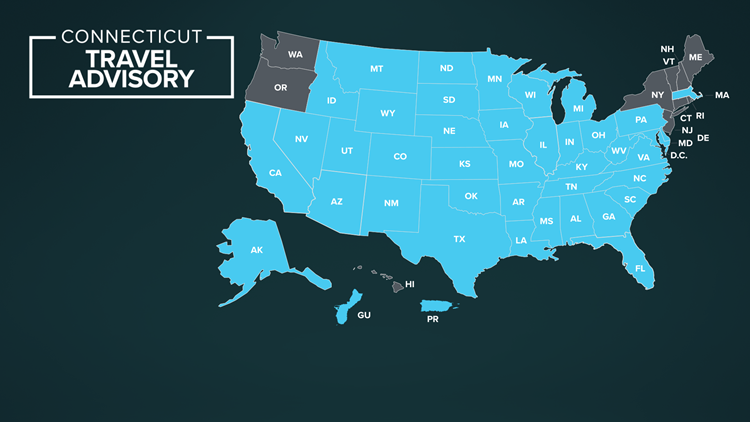CONNECTICUT, USA — There were three more states added to Connecticut's Travel Advisory list Tuesday.
California, Massachusetts, and Pennsylvania were all added to the list due to their COVID-19 cases. With these states, there are now 42 other states and territories listed. Anyone traveling from these states to CT must quarantine for 14 days.
Recently, Governor Lamont announced a change in criteria for a state to be added to the list. States with a positive case rate higher than 10 per 100,000 residents or higher than a 10 percent test positivity rate over a seven-day rolling average qualify for the list. Any counties which have been issued a Level 3 Travel Health Notice from the CDC must also quarantine.
On October 30, Massachusetts removed Connecticut from the DPH's lower risk state list for its travel order. Travelers from CT arriving into Mass. must fill out a form, quarantine for two weeks, or produce a negative test. The order goes into effect at 12:01 AM on October 31.
Below is the full list of states and territories:
- Alabama
- Alaska
- Arizona
- Arkansas
- California
- Colorado
- Delaware
- Florida
- Georgia
- Guam
- Idaho
- Illinois
- Indiana
- Iowa
- Kansas
- Kentucky
- Louisiana
- Maryland
- Massachusetts
- Michigan
- Minnesota
- Mississippi
- Missouri
- Montana
- Nebraska
- Nevada
- New Mexico
- North Carolina
- North Dakota
- Ohio
- Oklahoma
- Pennsylvania
- Puerto Rico
- South Carolina
- South Dakota
- Tennessee
- Texas
- Utah
- Virginia
- West Virginia
- Wisconsin
- Wyoming
Here are some frequently asked questions from CT's website:
If I am a Connecticut resident who must go to an adjacent Affected State for work, how does this impact me? Any Connecticut resident who needs to travel to an adjacent Affected State for work is not subject to the self-quarantine requirement as long as his or her time in the adjacent Affected State is less than twenty-four (24) hours. Any Connecticut resident who qualifies as an essential worker (e.g., as designated by the Cybersecurity and Infrastructure Security Agency) going to the bordering Affected State for work-related travel is not subject to the self-quarantine requirement. Any Connecticut resident who commutes to an adjacent Affected State and is unable to telecommute, and will only be in the Affected State for less than twenty-four (24) hours, is strongly advised to limit all other contact in that state while there. Employers in adjacent Affected States can continue to expect employees who are Connecticut residents to come to work as needed, though telework options are preferable if possible.
If I am a Connecticut resident who must go to an adjacent Affected State for work, are there precautions I should take? Yes. It is strongly encouraged that you to telework if appropriate and allowed by your employer. Further, you should limit your activities while in that state to your workplace only and avoid other public places and events, if possible.
If I live in an adjacent Affected State but work in Connecticut, can I still go to work? Yes. The self-quarantine requirement does not apply to residents of adjacent Affected States who must come into Connecticut for work, so long as their stay in Connecticut is less than twenty-four (24) hours. Connecticut employers can continue to expect any employees from adjacent Affected States to come to work as needed, though telework options are preferred if possible. Any resident from an adjacent Affected State who is unable to telecommute and is spending less than twenty-four (24) hours in Connecticut is also strongly encouraged to limit all contacts while in Connecticut. Connecticut employers with employees who are residents of adjacent Affected States should make every effort to provide telework options or otherwise limit employee time in Connecticut.



